Punk been one of the most enduring cultural movements of the modern era since its origin in social and political movements in the mid-1970s. Bands as The Clash, Sex Pistols, The Stooges and Siouxsie & the Banshees are all examples of a seventies punk scene in full swing. But punk is undoubtedly an international movement, taking root in almost every country to one degree or another.
One part of the world with a particularly long heritage are the countries often placed under the banner “Eastern Europe”, countries such as Poland, East Germany and Czechoslovakia that came under the grand umbrella of the Soviet Union’s “Satellite states”. Many popular bands from the West also played early in Eastern Europe, in particularly in Poland where bands as Raincoats did shows in late 1970s, and Western punk music was available for consumption. However, while the Eastern European countries were not entirely cut off from global influences, much of punk music was banned as “politically incorrect” and pointed out as a threat to “people’s democracy”; as such the punk scene in Eastern Europe was an anticommunist movement.
Fastforward thirty years and the “iron curtain” has disappeared and the punk scene the Eastern Europe is thriving. However, in former Soviet Union countries as Belarus, the struggle on the punk scene is a striking parallel to the music revolution in the 1980’s version of Poland and East Germany.
Close to the border to Poland, a similar punk rock revolution is on the rise, in Grodno, the fifth biggest city in Belarus. Because of the geographical location close to Poland, Western punk culture early influenced the scene in Grodno.
One of the up and coming punk bands from the Grodno punk scene has a special kinship with Messed!Up because we simply share names. Three-piece Messed Up was spotlighted three months ago and when they finally turned up to play Hamburg to tour their debut album “Everything You Believe In” they’ve had a signed deal with our favorite record lable, Hamburg based Audiolith Records.
And band members Lizzie, Masha and Nastya talk about the Belarusian punk scene, punk and politics in Belarus and being young women on a male dominated music scene.
“There’s no legacy on the Belarusian punk scene”
You have just finished your first German tour. How was it to tour Germany?
Lizzie: It was amazing! We’re still high on emotions from that whole thing. There were so many great people, loads of killer shows, crazy after-parties, and many other fun things that happened. People in every city came out for us, even in the middle of work week. We started the tour as that unknown tiny band from nowhere and didn’t really expect many people at our shows, but it was far better than what we expected.
Masha: Yeah, it was unbelievably cool, it was my dream coming true. I’m so happy that everything I expected also happened. I just love Germany so much.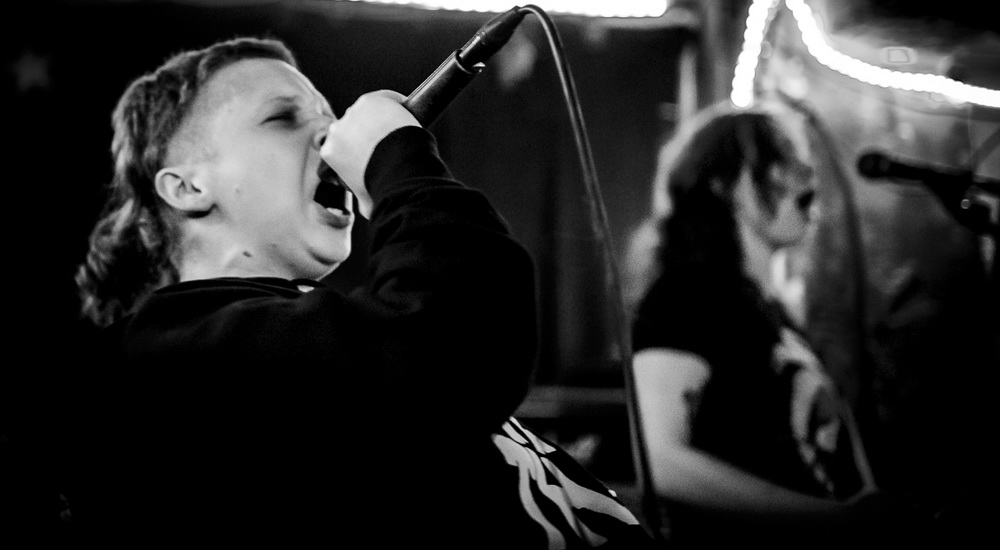
Nastya: The tour was the best thing that have happened in my life! Every day was like being embraced by tons of positive feelings from meeting all these new people, and to be play these killer shows!
Lizzie: Germany is easy to tour because it’s not far between cities, you don’t need to travel that many hours. In the beginning, doing those first gigs, was kind of easy, but close to midpoint we realized that it got harder and harder to play shows; half of the band got ill, but we tried not to think about it that much. With all the people around us, all the energy that you got from doing shows, drinking beers and other kinds of madness, we just continued (laugh). It wasn’t that hard to pull off the last show.
Nastya: People were so kind to us, there were lots of hugs after every night – just amazing! Going back home, back to my job and the grey reality is not that fun.
Masha: Every time I come here it feels like being back to the future, that’s why it’s not that fun to go back to Belarus with its tons of problems.
Lizzie: I think Messed Up are quite unusual as a band even for German people although you have a strong underground scene and a great feminist scene. You really don’t know that much about our scene, our political situation, social background and other stuff; I realized that during the tour. And for us, it was like a mission to show the German audience a piece of what Eastern Europe has to offer.
When we had you in our “In the Spotlight” a few months ago we actually didn’t know that you had signed to Audiolith Records in Hamburg. How did you end up meeting Lars and sign a deal with Audiolith for the debut album?
Lizzie: It is a really funny story. Two years ago I visited Hamburg for the very first time, it was when Mister X supported Moscow Death Brigade in Hamburg, and I was coming with Mister X because we’re from the same city, Grodno, and are close friends. At the show I met Lars, and I only knew that he is the labelboss releasing a split album with Mister X and this great hardcore band What We Feel, from Moscow.
We just started to chat about the gig and music in general, and I told him about my own band. But I wasn’t any good in English at that point and probably couldn’t explain anything to make it understandable, but Lars became interested. The next day I met him again in Kiel at another show and we just picked up our chat where we left the day before, even if we couldn’t communicate that well but booze sort things out (laughs).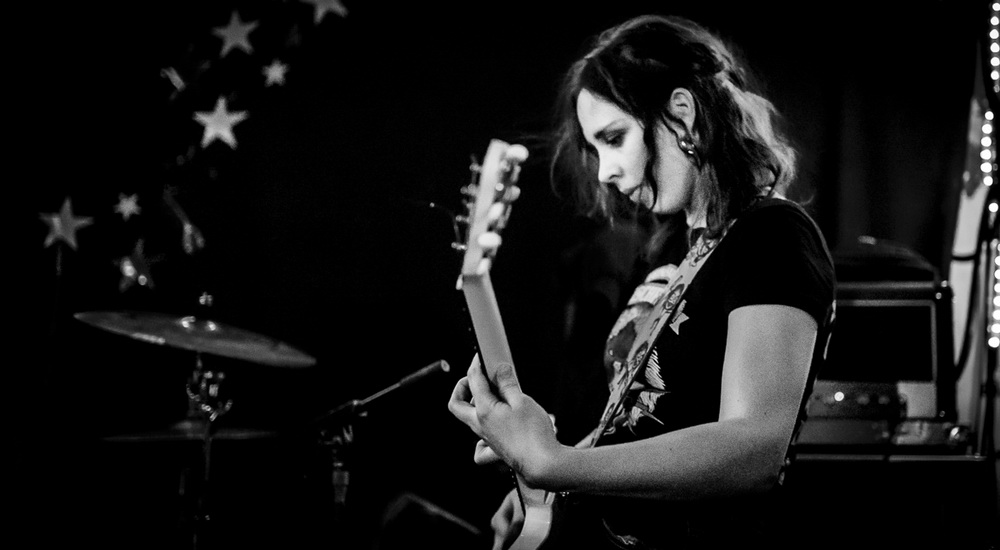
Very unexpectedly Lars suggested to help us out, and said that he’s interested to release us at Audiolith. I was shocked! Can you imagine? An anonymous girl like me, from Belarus, who used to play in a garage for thirty people, ending up rewriting the history of the Belarusian punk scene by signing a contract with a great independent German record label literally the next day after meeting with the boss? It was one of the best days of my life!
People in Germany probably don’t know anything about the punk scene in Belarus. In Germany and the UK, for instance, punk is still a big scene, but how is the vibe of the scene in Belarus, especially compared to other scenes in Belarus?
Lizzie: The Belarusian punk rock scene have never been big because we’re about 9,5 million people and punk may not be super popular in general. But if you come to Grodno with its 350 000 people, we have a great history of punk rock with loads of bands.
Grodno’s old school punk rock bands have serious political messages; everything that happened in our country was reflected on the punk scene, and it’s still the main message. The thing is that we have no squats, no Autonomous Centers, no leftist bars, no presence at all of any alternative places of freedom.
But the Belarusian scene goes in waves; people come and go over the course of a few years, then the next generation takes over. Unfortunately there’s not any huge legacy, especially when it comes to women on the punk rock scene. That’s why we try to do our best to influence other girls to become more active, more involved.
Masha: The scene in Belarus has some big problems to deal with, that’s obvious, and you can’t really compare it to Germany or the UK. It’s just two cities, the capital Minsk and our hometown Grodno, which have big punk movements. Well, maybe in Baranovichy; you may find a bit of activity, but that’s it, that’s the only three cities in the whole country.
Pop music and mainstream hip-hop catch young people’s interest. At punk gigs in Grodno there’s about fifty people turning up, mostly old friends and rarely any new faces. It’s the same in Minsk, maybe just a bit bigger crowd because of more people living there.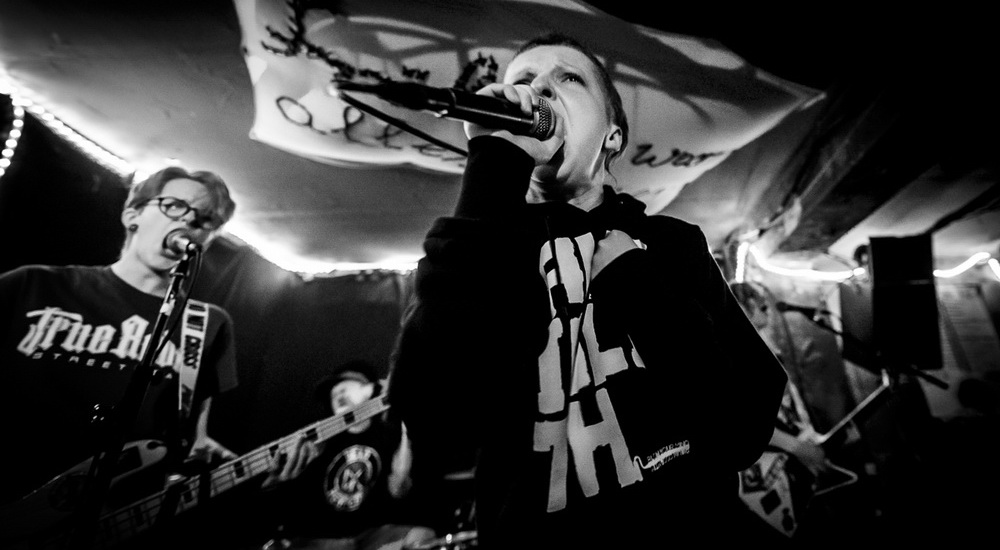
Nastya: We have huge problems with music in Belarus if it is not some mainstream shit. To put on a show, legally, in Belarus you need to ask local authorities for permission and pay for it. Now, if you’re singing about “improper” things they will turn you down and just send a “no concert certificate. That’s why most punk shows are illegal and the reason why we don’t get that many people to come out for the shows, but it may also be that there’s not that many punks either. I’m not sure.
The German punk scene was inspired by the UK in the 70’s but have created its own kind of punk genre which very often builds on irony. What was your initial influences when you started out? Which bands influenced you?
Lizzie: The Grodno punk scene has its own background in Belarus. Grodno is the city closest to the Polish border and because of that, from the late eighties, many polish music bands, but also some European and US bands, found their way to Grodno.
It won’t be wrong to say that Grodno has always been a bit influenced by the Western punk scene because of that, and it has lasted until today; we’ve had opportunities to exchange experience with foreign bands. That obviously makes the Grodno punk scene quite different from the rest of the Belarusian punk scene.
When we started Messed Up I was just fifteen, we were just teenagers, not political activists. I was obsessed with the UK and the New York punk bands; The Clash, Dead Boys, Television, Patty Smith, X-Rey Spex although I couldn’t understand their lyrics, but I loved their rebel spirit.
Everything that rejected the mainstream and laughed at it was attractive to me. I was so rebellious and didn’t want to be like that usual girl. I think it was this kind of youthful and teenage revolution in me. That’s why I was inspired by foreign punk rock and was rejecting everything that was popular here on home turf, and everything coming from the East.
What’s characteristic of the punk scene in Belarus? Does it have something very specific for Belarus like its own identity?
Lizzie: Belarusian punk rock now and ten years ago are different things. I think punk rock in every country has its own evolution because of different historical, political, and social background. The political, economic and cultural situation in every country is always reflected in the music of the rebellious, as in punk rock. If you ask me, punk rock is about not being too comfortable or about the sweet things in life, punk rock is about issues that hurt us, make us worried and force us to speak up about it.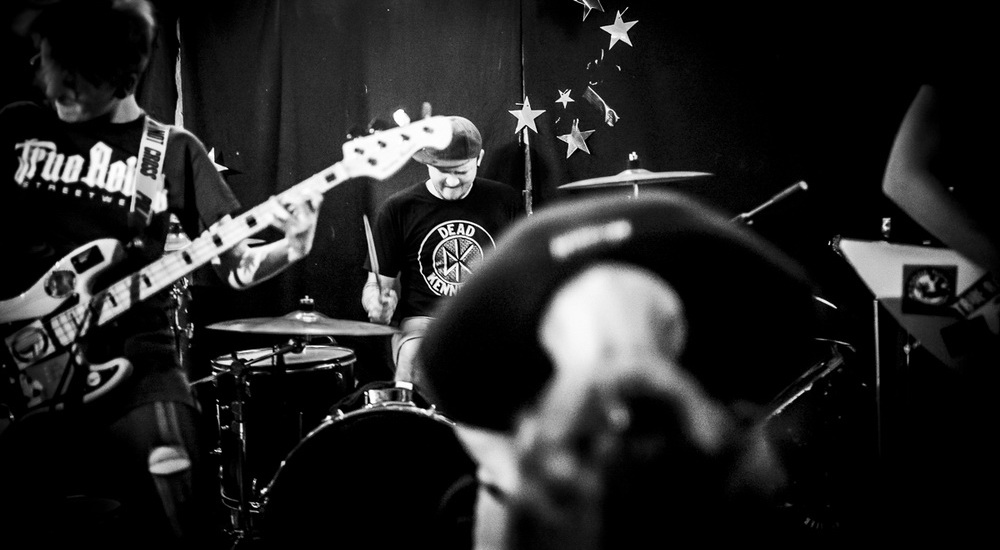
In Belarus we have a huge problem with police violence and freedom of speech, we have many problems in the social sphere, and the law doesn’t work that well in general. All of that is in our lyrics. Almost every band in Belarus sing about it. To me that’s important, but I don’t know how much or when every other Belarusian bands speak up about it or what they sing about specifically, so I can’t say if we have some common beliefs on the Belarusian underground scene.
Masha: But it’s hard to say. I think the most specific thing we have going concerning an identity of Belarusian punk scene is to buy the cheapest beer in the shop and drink it in front of the venue rather than spending tons of money on expensive beer in the venue bar. I’ve never seen anything like that in Germany, but Belarus is a rather poor country, that’s why people look for any opportunity to save money.
Being an activist in Belarus
“Mark down 2014 as the year that women tore down the punk-boy clubhouse and erected a big middle finger in its place”, Vulture Magazine wrote after having an unprecedented number of “female-fronted punk acts” at their yearly best of list.
However, punk has carried a strong female influence since its conception in the mid-1970’s. Heavy metal and rock dominated the popular music scene in the late ’60s and ’70s, almost excluding women altogether. As punk music developed, its counter-cultural nature gave way to heavy participation from women.
Contrary to a number of other popular genres today, women have defined punk rock from the beginning, acting as lead vocalists, instrumentalists, and fashion icons in the punk scene. Patti Smith is an undeniable early pioneer of punk, breaking out into the punk music scene in the early 1970s and helping to define an entire genre to this day; Corin Tucker, Carrie Brownstein and Janet Weiss under their alias Sleater-Kinney stood in the front of the Riot Grrrl movement in the beginning of the 1990s, together with Bikini Kill’s Kathleen Hanna; and in the 2010s there’s loads of women on the punk scene speaking up about feminism, female rights and sexist behavior in the crowd just like Shawna Potter (War On Women), Ren Aldridge (Petrol Girls) and of course the mysterious characters of Pussy Riot.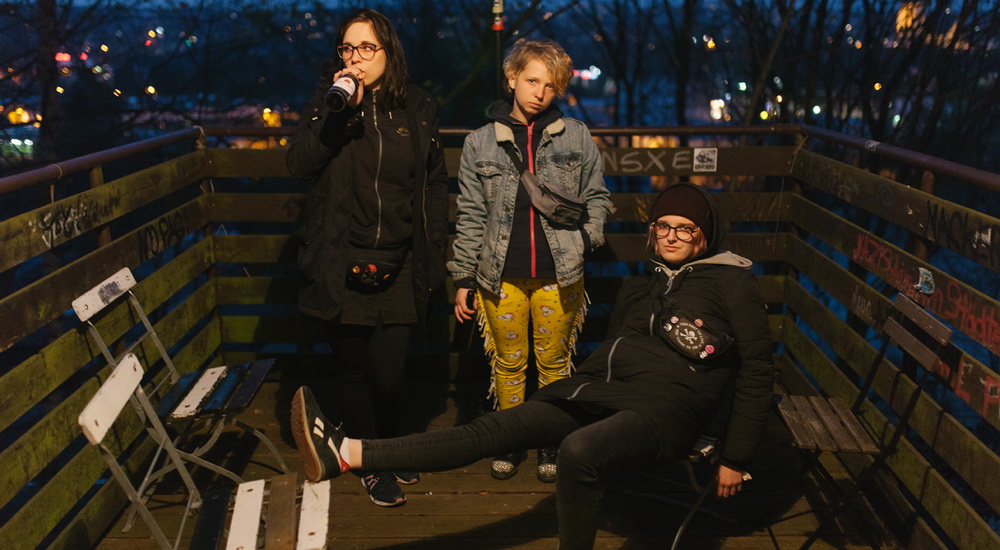
Messed Up continue to scream and shred about topics such as feminism, anti-racism and anti-homophobia, but being an activist in Belarus comes with problems.
Just like bands during the Riot Grrrl movement your lyrics are often politically charged and you bring up topics as feminism, anti-racism and anti-homophobia to mention a few. How is the climate in Belarus to openly speak up about these issues just like do?
Lizzie: It’s not that good because Belarus isn’t that open about things. We touch on those topics but mostly at concerts or at educational lectures or at workshops. Usually, people aren’t that interested in those problems except for a small group of punks or political activists.
It is like this because any grassroots activism whatever it’s about is strongly regulated by the authorities. Every political speech, post, or whatever you share online could be considered an extremist threat. A friend of us was really hit really hard when he shared this well-known antifascist propaganda poster with the boot smashing a swastika at his personal Facebook page. A judge considered it to be propaganda for fascism. That’s just so stupid!
Today, every kind of social or political activism that is anti-governmental could be called an act of extremism or terrorism. What it concerns feminism, it’s not dangerous to be a feminist in our country. Feminists are safe because we don’t hand-out pamphlets, organize demonstrations, or do any illegal things at all, we just try to change the Belarusian mentality by arranging as many educational workshops and lectures as possible, and cooperate with media by doing films about proper behavior.
But we’re still in the beginning on our path and we’re trying to make sure it’s not short-lived. We’re living in a post USSR country and people have yet to open their eyes. But many don’t want a change at the moment. There’s very few people who are open-minded and most of them are as young as us, so fingers crossed that we can make a change.
But being critical and speaking up about political issues may get you in trouble? How do you deal with that?
Lizzie: We’re lucky because at this moment, we don’t have any problems with the authorities. But there are many other examples when people have problems because of their political activism.
But I won’t say that we have many political topics in our lyrics, rather we put political slogans in our speeches during the shows and in interviews. Maybe that’s the reason why we don’t have any big problems or feel pressured by the authorities, but in a country like ours you never know what will happen tomorrow, so you really need to be aware of the consequences of your activism.
You’re also an all-female punk act in Belarus on a very male dominated music scene in general. As I recall, Belarus hasn’t come far in gender equality discussions, people rather indulge in stereotypes. How much of a struggle is it for you get attention on home turf?
Lizzie: Yeah, we know about that but we don’t have any problems on our scene. But it’s right, men dominate rock and punk rock in general, but in my opinion it’s because women avoid it; girls are not that interested in radical stuff. Very few women want to pick that kind of fight or to take part in a radical movement. That comes from home, from how parents teach the next generation of Belarusian citizens to be sexist.
Believe me, it’s so hard to fight that patriarchal mentality. That’s why we’re part of the punk scene because it take the fights with all gender stereotypes. Guys on the scene have supported us already from the beginning, they’re helping us with advice, technical stuff and other things. What we do on our scene in Belarus is to try to build up a society without gender and homophobic stereotypes and I’m very proud of being part of it.
But what are the main struggles, in general, of being a woman in music today?
Lizzie: It may seem silly, but the attention upsets me a bit. If guys play the same type of music, they won’t get as much attention as us, I can understand that because it doesn’t happen that often that girls get involved and become an important part of the punk rock scene.
Most people just want to support girls, but from time to time it goes in the wrong direction. I would prefer to not have this “your cool because your girls” thing around us but rather be understood as a band. But to be fair, I personally pay more attention to a band if there’s a girl in the band. It’s obvious that we need more girls on the scene, then that kind of inequality will be eliminated in a natural way.
I really believe that we one day will reach the point of being seen not as a women’s band, but as a normal band that isn’t elevated or hyped because of how many girls we’re in it. I really believe that that would be the day when we achieve equality in punk rock.
The goal set for touring Belarus
I know you just released the album and done your first bigger tour in Europe, but what’s the plan for the future?
Lizzie: We have no super big plans for now, but for sure want to continue growing on the punk rock scene. To be honest, we don’t want to be this huge success that play arenas or stadiums; we don’t really want to make money because it’s not important to us.
The main reason why we’re doing this is because of those awesome feelings that fill you when playing shows or meeting up with new people and get some new experiences. It doesn’t matter if it’s in England, Poland, Germany or Russia, we’re open to it all. We would just be happy to travel to new countries and meet people, just to grow as a band but also as individuals. Doesn’t is sound like a good plan? (laughs)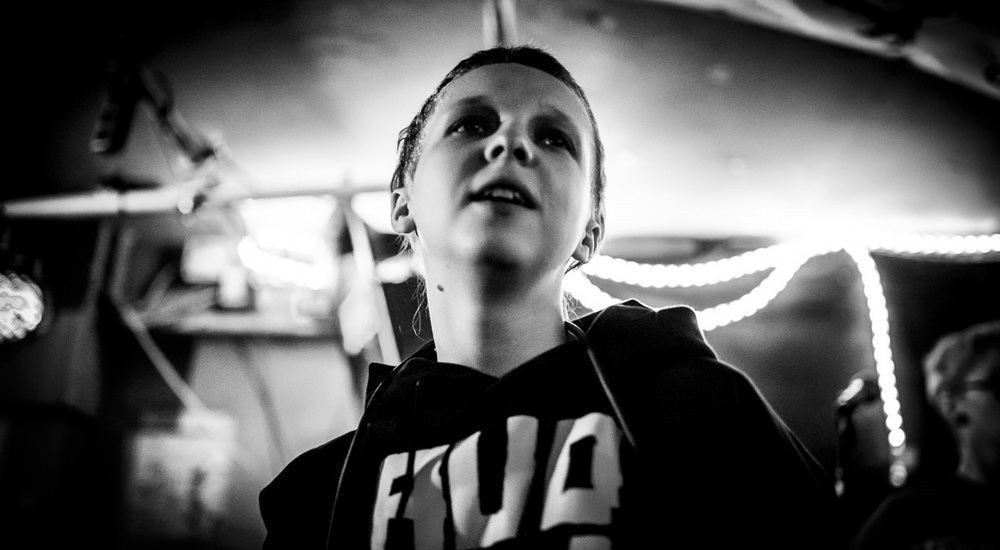
Have you already started to plan for doing new music, maybe release a single or an EP next year?
Lizzie: After the tour we need to have a short break, but after that, when we’re back in good spirit, we’re ready to work on new songs. We’ve not decided yet what it should be. Will we do songs for the next full-length album or just a few songs for some compilations or an EP? I know that I will use all my creativity to express all the feelings I bring with me from this tour, much from being inspired of the bands we’ve shared stages with.
In three years, where will Messed Up be? Touring UK?
Lizzie: Nope! Touring Belarus I hope. I’m not fooling you! It’s true that we have more shows in Germany than in Belarus, but I want to be more recognized in my own country. It’s sad and absurd that we have more fans outside Belarus.
It’s like a mission to me to not just tour across Europe and tell people how it is to live in a post-Soviet country, but to try to put some of the European mentality into our conservative stereotypical society, and maybe the next generation will be a bit cleverer than the previous one. That’s very ambitious, but we’re Messed Up and if weren’t then this interview with Messed!Up magazine wouldn’t have happened.
We love the challenges and we love to be winners!
Band photos: Evgeni Attetsky
Live photos: Kevin Winiker
Messed Up pages
Messed!Up Recommends
 Messed!Up
Messed!Up



